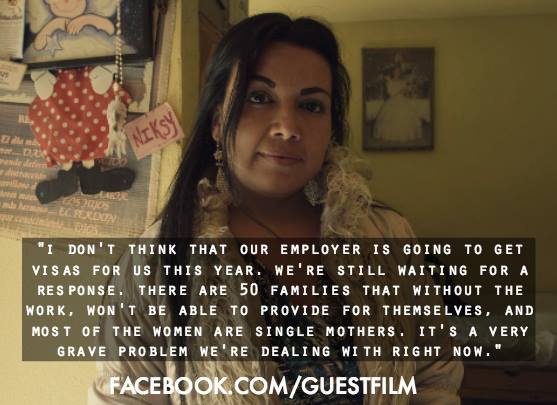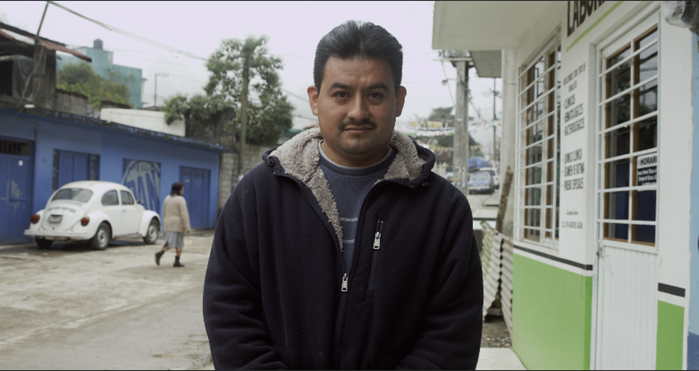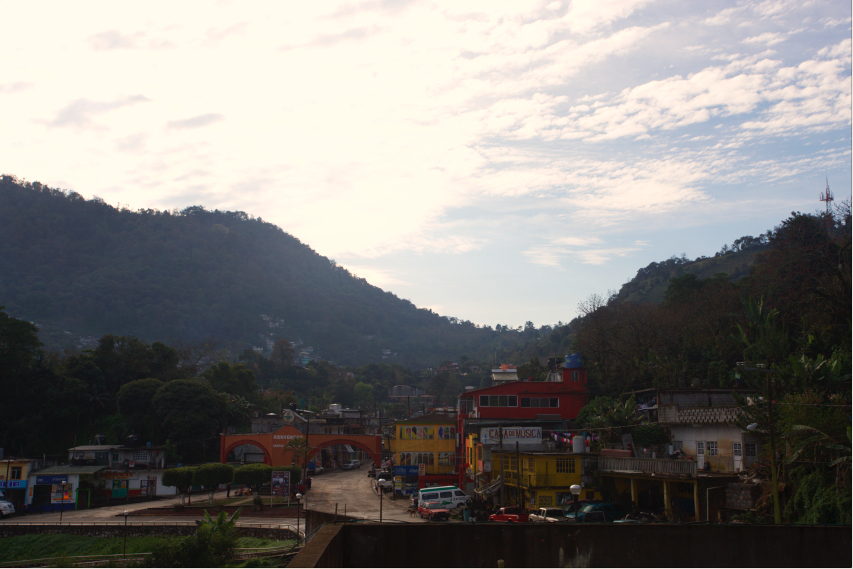This is What It's Like to be A U.S. Guest Worker

By:
In her new documentary, "Guest," filmmaker Lindsay Van Dyke explores what it's like to be in the U.S. guest worker program. Having lived in Mexico for the last eight months, Van Dyke, a Fulbright scholar, has met many workers in the program, which she's learned has much room for improvement. We had a chance to talk with Van Dyke about her project, which is also on Kickstarter, and what she's learned spending time with the guest workers who appear in her film.
Editor’s note: this transcript has been edited for clarity and conciseness.
Where do you think the U.S. would be without guest workers? Obviously it's very hard for them to work in the U.S., but where would we be without them here?
The U.S. agriculture system relies on migrant farm workers from Mexico. The H2-A Visa program brings about 66,000 people from Mexico to fill these jobs, although I believe the estimate that I recently read was anywhere from 1 to 3 million farmers from Mexico are here without papers. Without guest workers, we're lacking a very critical labor force that helps feed American families. For workers who have a good experience, they're making money for their families while helping feed American families. Without their labor, I've read report after report, particularly in agriculture, where farmers cannot find Americans to work for the wage that they're giving. If we don't have people out there to process our food, that could have a huge effect on our economy and livelihood in the U.S.
As far as the H2-B workers, if you've ever eaten a crab cake, it's probably an H2-B worker who processed the crab meat. These people, who are essentially invisible to most Americans, are the ones preparing a lot of the things that we use. H2-B workers are people who are cutting grass in the summer, making people's lawns look good. Those things are a little more superficial, but the reality is they're in the U.S. and will continue to come to the U.S. and I am very interested in learning how it could be possible to navigate through this visa system to make it safer for people to come while fitting employers' needs and not undermining low-income people and people without education in the U.S.
So far, what have people across the border told you about the guest worker program?
It's been very interesting. It's been mixed. People who I have spoken with have gone to the U.S. dozens of times to work in various industries, and it has been critical to their livelihood and to support their families. So for them, it has been a great solution because it's a legal way people can go to the U.S., work for a seasonal period, and come back. With illegal immigration -- going across the border without papers -- coming back isn't really a possibility. It's very dangerous to come back every year, so people miss their families and essentially can't leave [the U.S.], so for them to be able to come back is a great benefit. Obviously, being promised a prevailing wage in the U.S. [is a good thing]. When they do get it, it's much higher than the 70 to 100 pesos they'd normally make [in Mexico].
Have their experiences been negative or positive?
The issue of labor fraud here is a problem. For example, one woman has had three experiences with it, one of which paints the complexity and ridiculousness of the level of fraud happening. She thought she was going to be getting a visa to clean houses in the U.S., and so she was told by this recruitment agency that she would have to take a housekeeping course to go through the process of getting her visa. She took the course, was given her diploma, paid thousands of pesos to get this diploma, and never heard from them again. You have instances such as these where people pay incredibly high recruitment fees to these labor recruiters for jobs that don't exist at all. Or maybe they do exist, but they'll pay very high fees, which is illegal in the U.S. and Mexico, but there's really no enforcement on that, so it continues to happen. The common thread there is that even though these issues exist with labor abuse, there will always be people who apply and try to go [to the U.S.] because of the opportunity that it could present to them.
Also, when I talk about the guest worker program, I'm talking about the H2 visas, which are basically H2-A and H2-B Visas. H2-As are what people get mainly from Mexico. I believe around 93 percent of people who come with H2-A visas to the U.S. are from Mexico. H2-B visas are essentially anything outside of agricultural work, so like carnival workers and landscapers. Upon working on this film, what I've realized is that the implications of the program reach beyond this issue of labor recruitment, and that's why I've expanded it to create this bi-national [U.S. and Mexican] perspective because not only are these issues affecting Mexican people, but American people. So I am really curious about the greater picture of where the guest worker program fits into the global economy.
What drove to you make a film on this subject?
I've always been interested in immigration and economic issues. When I was thinking about what to make this film about, I realized there are a lot of documentaries about illegal immigration, and it's really important that there are. But as far as the guest program goes, there hasn't really been a comprehensive look into this issue from both sides of the border, so when I was thinking about a film to make, I thought this was seriously lacking in terms of available media that exists. That's why I chose to focus on this issue.
I've been living in Mexico since August as a researcher on a Fulbright grant. I've been looking into the guest worker program. When I came, I had sort of an understanding about the recruitment issues here with labor recruiters, but then when I actually started doing the on-the-ground research, I learned a lot more in dropping my assumptions and allowing the people I'd been talking with to tell me their stories. Essentially since I've been working on it since August, what I've come to understand is that it's a lot more complex than I initially thought.
Why do you think it's so hard for these folks to get visas from their employers? I looked at your Facebook page and read about a woman who said that it was taking forever for her. Where do you think this difficulty comes from?

That [meme referred] to the Department of Labor, which basically stopped the H2-B Visa processing because of a court case in Florida. They've since resumed, but with particular industries, such as crab picking, it's really troublesome because that season is already in full swing, so I'm not sure she's going to be able to go. The other reason it's often difficult to get visas is because the process is extremely complicated and lengthy. Sometimes it takes a long time if the visa doesn't happen when the season of the work occurs. That is not going to allow somebody from Mexico to come work in that season.

Photo: Alex Reynaud
How are you hoping this film improves the guest worker program?
In an ideal world, I think understanding that there are critical issues that people from Mexico deal with in terms of labor recruitment and labor fraud and abuse. If that could be addressed, that would be something that I hope gets accomplished with the film.
The second thing is to look at some of the global economic forces that employers are facing that require them to use guest workers. How is it that we need this source of labor, but are unable to pay, and if we could pay a higher wage, could Americans actually do these jobs in areas of high unemployment?

Photo: Alex Reynaud
Do you have a sense of what a typical day might look like for a guest worker?
I think it very much depends on the industry. When I talk to people, like those working in crab picking for example, they say the work isn't hard, but it's tedious. In some instances, they get paid per pound, so that's very fast, tedious work in which they're picking meats from hundreds and hundreds of crabs. The hours vary as well. Depending on shipments, they might be working a lot or not working as much.
Have the guest workers told you anything about how they're treated in the U.S.?
Again, I've heard good and bad experiences. Housing is a big issue. I think some people feel that a lot of times, the housing will be near the properties of where they're working. When I've talked to them about what that's been like, some have said it's been fine and that they're happy with their living conditions.

Hidalgo, Mexico, one of the film's shooting locations. Photo: Alex Reynaud.
What do you think drives these guest workers to partake in this program and work in the U.S.?
There are a few reasons. The first is that there is no other option for people. Some people live in such remote communities [in Mexico] that their [employment] options are limited. When they learn about the visa program, they say, "Wow, I can go to the U.S. and not have to face what's happening for those crossing the border illegally?" To see a seemingly safer way to go is huge for them,
The idea that they will be able to make the prevailing wage is significant as well. It's like the comparison between eight dollars an hour to eight dollars a day. So they see they're going to make a lot more money, and, as I mentioned earlier, they can come back. For them, it's sort of a solution to the obstacles of crossing the border without papers. Having the threat of getting killed for coming across illegally isn't seemingly something that could happen to you in the visa program. For that reason, it's something people want. The demand is high, and that's why there's been an economy created around visas.
Is there anything else you'd like to add or want our readers to know?
If you look around your environment, most things that have been made have been made by migrant labor. I think that's why this issue is incredibly important and prevalent. Talks about immigration reform are always in the headlines. It's important to think about who is behind these products and also to look past maybe some of the headlines in terms of how Mexico actually is. I think it's important to look past your preconceived notions about a country that is our neighbor.
